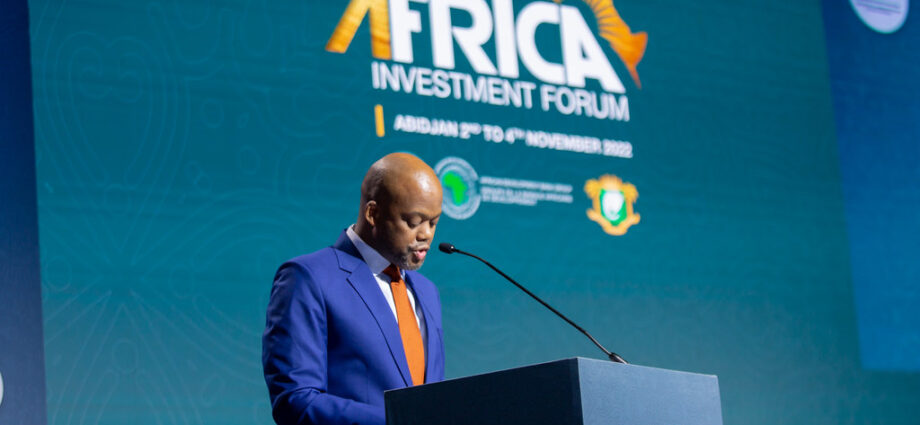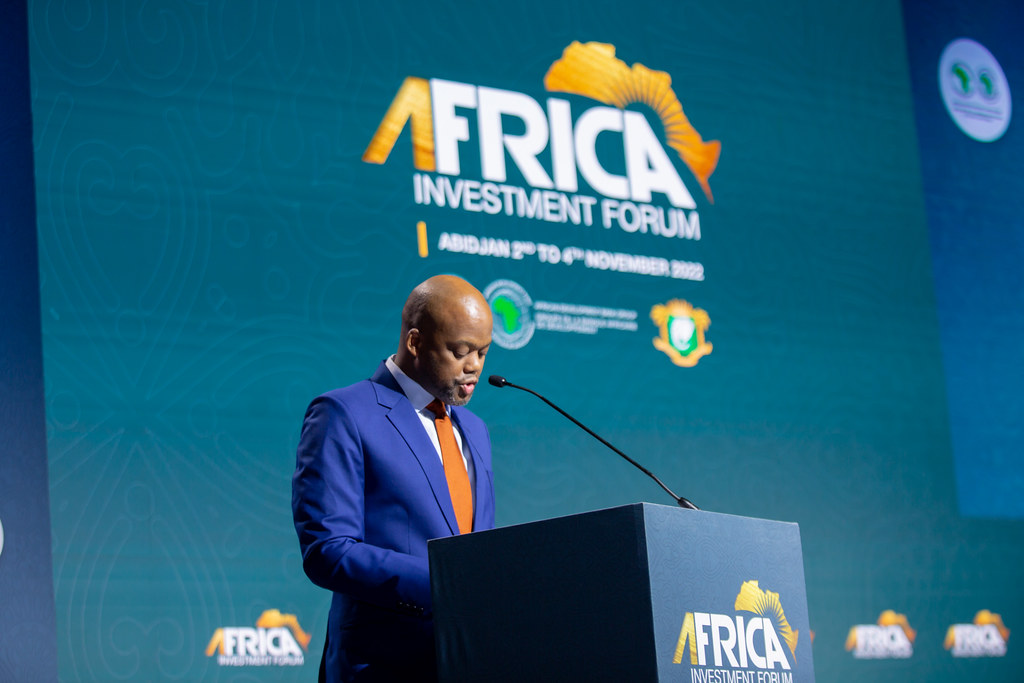The African continent has enormous potential and remains an attractive destination for investors, despite complex national contexts and geopolitical changes, say experts attending the Africa Investment Forum 2022 Market Days.
Africa is facing external shocks that negatively impact its growth and socioeconomic development. The Covid-19 pandemic has compromised the sustained growth that the continent has enjoyed for the last 25 years, and the Russian-Ukraine war is threatening populations with a severe food crisis.
Panelists raised these points on Thursday, 3 November 2022, during the Forum held from 2-4 November in Abidjan, Côte d’Ivoire.
During the session titled “Trade and Investment: How can Africa be more competitive in the world context?” Souleymane Diarrassouba, Ivorian minister for Trade, Crafts, and Small and Medium Enterprises; Benedict Okey Oramah, African Import-Export Bank (Afreximbank) President; and Wamkele Mene, Secretary General of the African Continental Free Trade Area Secretariat, made opening remarks.
Other speakers were Admassu Tadesse, President of the Eastern and Southern Africa Trade and Development Bank; Rajakumari Jandhyala, President of YAATRA Ventures (a platform offering investors a specific approach for deploying capital in energy, infrastructure and added-value opportunities in Africa and emerging markets); Mohan Vivekanandan, Director of the Development Bank of Southern Africa; and Bernard Ayitée, President and Director General of Obara Capital (an investment fund offering solutions and alternative financing to enterprises and African countries).
Africa’s potential in the world economy is growing. Most of its population is young people; a quarter of the world’s population is likely to live in Africa between now and 2050, and the African Free Trade Zone is making progress. Nearly two-thirds (65%) of unused arable land is found in Africa, which is also rich in minerals (including cobalt, lithium that are essential for producing batters, and Africa is the world leader in such agricultural products as cacao, coffee, cotton, essential oils, mahogany).
Minister Diarrassouba emphasized Africa’s relatively low production costs: “Africa is the world’s most profitable region, according to the OECD. Investors from the continent and elsewhere ought to seize its enormous investment opportunities”.
Benedict Oramah called on African countries to redouble their efforts to make the free-trade zone fully operational so that Africa no longer lags behind other regions in regional integration.
Wamkele Mene argued that the free-trade zone, representing a market of 1.3 billion consumers, will increase Africa’s global competitiveness for direct foreign investments and free up commercial flows.
He said certain transaction costs had already dropped since the agreement took effect and urged countries to develop their value chains in productive sectors, including agriculture, mines, and energy. Mene also announced the Third Inter-African Trade Fair this November in Abidjan.
The session outlined ways the continent can take advantage of ambitious trade policies and innovations in financial services to facilitate capital flows toward development projects. Delegates pointed to the significant progress banking institutions have made in infrastructure investment.
“We can be hopeful. The levels of collaboration and co-financing are high,” Tadesse said, citing investments in gas projects in Mozambique and thermal energy in Tanzania.
YAATRA Ventures gave the example of its investments in energy security in Uganda, emphasizing that African investors’ perception of risk differs from that of Western investors.
Panelists agreed that if African financial institutions have a fundamental role to play for long-term investors in the continent, it’s up to the African countries to create an environment that is promising for attracting national and international investors.
Source: afdb.org
Share this news
This Year’s Most Read News Stories

Elon Musk’s company to launch internet in Tanzania
Elon Musk’s Starlink internet service is expected to be available in Tanzania in the first quarter of 2023, with analysts saying the new development will boost the digital economy.Continue Reading

Tanzania Confirms Outbreak of Marburg Virus Disease
Dodoma — Tanzania today confirmed an outbreak of Marburg virus disease in the northwestern Kagera region after one case tested positive for the virus following investigations and laboratory analysis of suspected cases of the disease.
President of the Republic of Tanzania, Her Excellency Samia Suluhu Hassan, made the announcement during a press briefing alongside World Health Organization (WHO) Director-General, Dr Tedros Adhanom Ghebreyesus, in the country’s administrative capital Dodoma.
“Laboratory tests conducted in Kabaile Mobile Laboratory in Kagera and later confirmed in Dar es Salaam identified one patient as being infected with the Marburg virus. Fortunately, the remaining suspected patients tested negative,” the president said. “We have demonstrated in the past our ability to contain a similar outbreak and are determined to do the same this time around.”
A total of 25 suspected cases have been reported as of 20 January 2025, all of whom have tested negative and are currently under close follow-up, the president said. The cases have been reported in Biharamulo and Muleba districts in Kagera.
“We have resolved to reassure the general public in Tanzania and the international community as a whole of our collective determination to address the global health challenges, including the Marburg virus disease,” said H.E President Hassan.
WHO is supporting Tanzanian health authorities to enhance key outbreak control measures including disease surveillance, testing, treatment, infection prevention and control, case management, as well as increasing public awareness among communities to prevent further spread of the virus.
“WHO, working with its partners, is committed to supporting the government of Tanzania to bring the outbreak under control as soon as possible, and to build a healthier, safer, fairer future for all the people of Tanzania,” said Dr Tedros. “Now is a time for collaboration, and commitment, to protecting the health of all people in Tanzania, and the region, from the risks posed by this disease.”
Marburg virus disease is highly virulent and causes haemorrhagic fever. It belongs to the same family as the virus that causes Ebola virus disease. Illness caused by Marburg virus begins abruptly. Patients present with high fever, severe headache and severe malaise. They may develop severe haemorrhagic symptoms within seven days.
“The declaration by the president and the measures being taken by the government are crucial in addressing the threat of this disease at the local and national levels as well as preventing potential cross-border spread,” said Dr Matshidiso Moeti, WHO Regional Director for Africa. “Our priority is to support the government to rapidly scale up measures to effectively respond to this outbreak and safeguard the health of the population,”
Tanzania previously reported an outbreak of Marburg in March 2023 – the country’s first – in Kagera region, in which a total of nine cases (eight confirmed and one probable) and six deaths were reported, with a case fatality ratio of 67%.

Sign up for free AllAfrica Newsletters
Get the latest in African news delivered straight to your inbox
In the African region, previous outbreaks and sporadic cases have been reported in Angola, the Democratic Republic of the Congo, Ghana, Kenya, Equatorial Guinea, Rwanda, South Africa and Uganda.
Marburg virus is transmitted to people from fruit bats and spreads among humans through direct contact with the bodily fluids of infected people, surfaces and materials. Although several promising candidate medical countermeasures are currently undergoing clinical trials, there is no licensed treatment or vaccine for effective management or prevention of Marburg virus disease. However, early access to treatment and supportive care – rehydration with oral or intravenous fluids – and treatment of specific symptoms, improve survival.
Source: allafrica.com

Tanzania: Samia Hands Over NBC’s 354m/ – Crop Insurance Compensation to Farmers Affected By Hailstorms
President Samia Suluhu Hassan, has handed over a cheque of 354m/- from the National Bank of Commerce (NBC) as compensation to tobacco farmers, who were affected by hailstorms during the previous farming season in various regions across the country.
Handing over the cheque in Dodoma, the compensation is part of the crop insurance service provided by NBC in collaboration with the National Insurance Corporation (NIC).
Furthermore, President Samia has also handed over health insurance coverage to members of the Lindi Mwambao Cooperative Union based in Lindi Region, through the Farmers’ Health Insurance service provided by the bank in partnership with Assurance Insurance Company.
While visiting the bank’s pavilion at the Nanenane Agricultural Exhibition and being received and briefed by the bank’s Managing Director, Mr. Theobald Sabi, she said: “This crop insurance is one of the crucial solutions in ensuring farmers have a reliable income, without fear of challenges such as natural disasters, including hailstorms.
“I call upon all farmers in the country to make the best use of this important opportunity by accessing these kinds of insurance services. I also highly commend NBC and all the stakeholders participating in this programme.”
Elaborating further on the crop insurance service, the Minister of Agriculture, Hussein Bashe, stated that it will help to recover the loss farmers incurred, especially in various calamities beyond their control.
Citing them as floods, fires, and hailstorms, which have significantly affected the well-being of farmers and caused some to be reluctant to invest in the crucial sector, Mr Bashe added: “However, our President, this step by NBC is just the beginning, as this is the second year since they started offering this service, and the results are already visible.

Sign up for free AllAfrica Newsletters
Get the latest in African news delivered straight to your inbox
“As the government, we promise to continue supporting the wider implementation of this service, with the goal of ensuring that this crop insurance service reaches more farmers.”
ALSO READ: NBC participates in TFF 2023/24 awards, promises to enhance competition
On his part, Mr Sabi said that the farmers who benefited from the compensations are from 23 primary cooperative unions in the regions of Shinyanga, Geita, Tabora, Mbeya, Katavi, and Kigoma.
He added: “In addition to these insurance services, as a bank, through this exhibition, we have continued with our programme of providing financial education and various banking opportunities to farmers, alongside offering them various loans, including loans for agricultural equipment, particularly tractors, to eligible farmers.:
At the NBC booth, President Samia also had the opportunity to be briefed on the various services offered by the bank to the farmers namely crop insurance and health insurance services.
There, the President had the chance to speak with some of the beneficiaries of the services, including the Vice-Chairman of the Lindi Mwambao Primary Cooperative Union, Mr. Hassan Mnumbe, whose union has been provided with a health insurance card from the bank.
Source: allafrica.com












